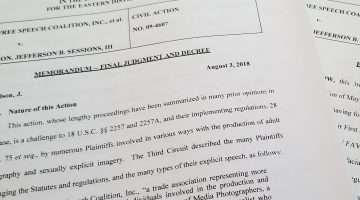 VATICAN CITY – What would Jesus do about segregating the Web along religious lines? According to the Pope, no member of the Holy Trinity would sanction the Internet Corporation for Assigned Names and Numbers setting aside generic top-level domain spaces for URLs ending in “dot-YourReligionHere.”
VATICAN CITY – What would Jesus do about segregating the Web along religious lines? According to the Pope, no member of the Holy Trinity would sanction the Internet Corporation for Assigned Names and Numbers setting aside generic top-level domain spaces for URLs ending in “dot-YourReligionHere.”
The Pontiff has called upon ICANN to resist temptation when it comes to issuing gTLDs like “dot-catholic,” dot-protestant,” dot-hindu,” “dot-muslim,” “dot-buddhist” and “dot-orthodox.” His Holiness feels the road to hell is paved with good intentions to expand the cybersphere. Under the Web regulatory body’s plan to allow virtually unlimited gTLD applications, ICANN could find itself mediating between competing factions for control over a particular religion’s namespace, the Pope noted in a letter to ICANN’s board.
According to outgoing ICANN President Paul Twomey, Pope Benedict XVI warned “bitter disputes” could force ICANN into “recognizing to a particular group or to a specific organization the legitimacy to represent a given religious tradition.”
ICANN announced last year that it is considering a process the organization feels will lower barriers to entry for new gTLD registries. The plan potentially could result in ICANN awarding contracts for hundreds of new gTLDs over the next few years — a pace significantly stepped up from the organization’s behavior of the past, when only a handful were awarded every couple of years. By mid-2007, only 21 gTLDs existed.
The problem with the new gTLD scheme, as ICANN discovered almost immediately, is that trademarks, service marks and other identifiers could represent a rat’s nest of controversy if more than one registrar-hopeful applies to manage a gTLD that represents a name or concept used across a variety of categories. Even seemingly innocuous terms like “mustang” (which has been trademarked for both a car and a timepiece) and “delta” (which serves as the trademark for an airline and a plumbing-fixtures manufacturer) could provoke significant rows — and that’s without throwing into the mix terms with both sexual and mainstream connotations. Also at issue: How to prevent blocking of entire namespaces by countries and internet service providers who are offended by either ICANN’s behavior or the namespaces themselves.
ICANN representatives have said the organization primarily conceived of the expanded gTLD registration scheme as a way for cities, counties, states and other recognized groups to secure their own corner of cyberspace for marketing reasons. Critics argue the plan is a way for ICANN to fatten its own coffers, as application fees are steep.
Intellectual property attorneys, trade groups like the International Trademark Association, business titans like Microsoft and Time Warner and media organizations like News Corp. have objected to the plan from the get-go, accusing ICANN of kowtowing to registry organizations in search of additional funds at the expense of cybercitizens. Hundreds of new namespaces, the critics argue, mean companies, organizations and individuals will be forced to protect their interests in hundreds of places. Combine that with ICANN’s recent proposal to uncap domain registration fees, and a recipe for financial disaster emerges, especially during a period of global economic unrest when many entities are struggling just to stay afloat.
Although ICANN had planned to begin the first round of new gTLD applications during the second quarter of 2009, the organization has decided to delay the plan until as late as the first quarter of 2010 in order to study potential snafus more thoroughly.












No Comment